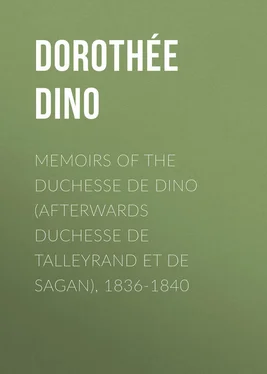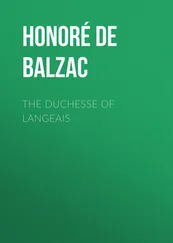Dino Dorothée - Memoirs of the Duchesse de Dino (Afterwards Duchesse de Talleyrand et de Sagan), 1836-1840
Здесь есть возможность читать онлайн «Dino Dorothée - Memoirs of the Duchesse de Dino (Afterwards Duchesse de Talleyrand et de Sagan), 1836-1840» — ознакомительный отрывок электронной книги совершенно бесплатно, а после прочтения отрывка купить полную версию. В некоторых случаях можно слушать аудио, скачать через торрент в формате fb2 и присутствует краткое содержание. Жанр: foreign_antique, foreign_prose, на английском языке. Описание произведения, (предисловие) а так же отзывы посетителей доступны на портале библиотеки ЛибКат.
- Название:Memoirs of the Duchesse de Dino (Afterwards Duchesse de Talleyrand et de Sagan), 1836-1840
- Автор:
- Жанр:
- Год:неизвестен
- ISBN:нет данных
- Рейтинг книги:4 / 5. Голосов: 1
-
Избранное:Добавить в избранное
- Отзывы:
-
Ваша оценка:
- 80
- 1
- 2
- 3
- 4
- 5
Memoirs of the Duchesse de Dino (Afterwards Duchesse de Talleyrand et de Sagan), 1836-1840: краткое содержание, описание и аннотация
Предлагаем к чтению аннотацию, описание, краткое содержание или предисловие (зависит от того, что написал сам автор книги «Memoirs of the Duchesse de Dino (Afterwards Duchesse de Talleyrand et de Sagan), 1836-1840»). Если вы не нашли необходимую информацию о книге — напишите в комментариях, мы постараемся отыскать её.
Memoirs of the Duchesse de Dino (Afterwards Duchesse de Talleyrand et de Sagan), 1836-1840 — читать онлайн ознакомительный отрывок
Ниже представлен текст книги, разбитый по страницам. Система сохранения места последней прочитанной страницы, позволяет с удобством читать онлайн бесплатно книгу «Memoirs of the Duchesse de Dino (Afterwards Duchesse de Talleyrand et de Sagan), 1836-1840», без необходимости каждый раз заново искать на чём Вы остановились. Поставьте закладку, и сможете в любой момент перейти на страницу, на которой закончили чтение.
Интервал:
Закладка:
Paris, May 21, 1837. – M. de Talleyrand, M. and Madame de Valençay, Pauline, and myself are invited to stay at Fontainebleau throughout the festivities – that is to say, we are to come on May 29 and to stay till June 3, inclusive. This is a favour, as nearly everybody else has been invited at successive intervals of twenty-four hours.
One of my German friends, a canoness, and a clever and intelligent person, 66 66 Fräulein Sidonie von Dieskau, of whom mention will be made later on the occasion of the Duchesse de Talleyrand's journey to Germany.
writes to me as follows concerning the Princess Helena of Mecklenburg: "The most amiable, the best educated, the kindest of the German princesses is to adorn the throne of France. I am sure that she will please you greatly. She is as cheerful as a child of fifteen, with as much sense as a person of thirty. She combines the charm of every age."
The Marquis de Praslin and the Duke of Treviso are the two knights-of-honour in subordination to the uncivilised Duc de Coigny, who will lead them.
Paris, May 22, 1837. – The Duc d'Orléans will first go to Verdun, to see without being seen, and then to Melun to be seen. Henry IV. in disguise went to the frontier to see Marie de Medici at supper, and Louis XIV. did the same at Fontarabia.
Among the persons invited to Fontainebleau there is one who certainly could not have been forgotten, in my opinion, and this is the great Mlle. Palmyre, the famous dressmaker. The fact is that she has been working upon a pattern sent from Mecklenburg, but I am by no means certain that this pattern is a good one or well made. Thus the eighty dresses of the trousseau may fit badly, and it is just as well to have some one there to make readjustments when necessary. Merchants, workmen, omnibuses, and post-chaises are all in confusion; the expenditure, the orders, and the activity are inconceivable. It is impossible to get anything, and tradesmen certainly have not the right to complain, for every one is on the move. A crowd of foreigners have also arrived at Paris, most of them English.
The Werther family have resolved to leave immediately after the marriage of the Prince Royal, without waiting for the festivities, for Herr von Werther has agreed to take M. Ancillon's place. They are very good people, who will be regretted at Paris, and who are also very sorry to leave.
Paris, May 25, 1837. – For the 29th and 30th, the days of arrival and marriage, the Marshals have been invited to Fontainebleau, with the officials of the two Chambers, the Ministries of October 11, February 22, September 6, and all the present Cabinet. I have always said that Fontainebleau was a chronological castle. It was resolved not to go further back than October 11, to avoid the necessity of inviting M. Laffitte. All the chief presidents of the courts have also been invited, and of the Diplomatic Body Herr and Frau von Werther, 67 67 Baron Werther was Prussian Minister at Paris from 1824.
M. and Madame Lehon. 68 68 Comte Lehon was Belgian Minister.
The rest are invited for the other days, two at a time.
I must mention an incident concerning Madame Molé, who vegetates rather than lives. The other evening at the Duchesse de Montmorency's people were saying how sorry the Werthers were. She asked why. "At leaving Paris, of course." She replied: "But to go to Fontainebleau is not very sad nor very tiring." "But, madame, Herr von Werther is going to Berlin to take the place of M. Ancillon." "Oh, then M. Ancillon is coming here?" I do not think that after such an experience any one will accuse M. Molé of betraying diplomatic secrets to his wife.
The Queen of England has written a charming letter to the French Queen concerning the marriage of the Prince Royal, and, in view of her close relationship with Princess Helena, has sent her a magnificent Indian shawl, one of the most beautiful that has ever come out of the wealthy storehouses of the Company. It is said to be a marvel. I shall see it at Fontainebleau, where the wedding presents will be displayed.
Paris, May 26, 1837. – The King of England held the last Drawing-room seated; since then he has felt worse, and people are anxious about him. It is said that he wished to live long enough to thwart the desires of the Duchess of Kent, by not leaving her to act as Regent for a single day, and the Princess Victoria attained her majority two days ago.
They say that anarchy is at its height at Madrid, and also that Don Carlos is at his wits' end.
The Duc de Broglie and the gentlemen of his suite are writing enthusiastic letters about the Princess Helena. All say that she has a very pleasant appearance; all seem to be in love with her, and cannot speak enough of her delightful manners, while she is said to be excellently dressed. The trousseau, which has been ordered here, is said to be very magnificent.
Fontainebleau, May 30, 1837. – Writing here is a feat of some ingenuity. The weather was too fine yesterday, and a great storm followed; it burst in the morning, and cleared ten minutes before the arrival of the Princess, who was received in bright sunlight and with much emotion. Her arrival was a fine spectacle; a family scene amid the most royal splendour. The Princess showed much emotion, no embarrassment, nobility and grace, and was equal to the occasion. I do not know if she is pretty; she is so gracious that people have not considered that point. She reminds one a little of Madame de Marescalchi, but is of a much more German type, while the lower part of her face recedes a trifle. She has beautiful hair, a good complexion – in short, she looks very well, and the Prince Royal is well pleased.
Pauline never left my side even at dinner, to which I was taken in by the Baron von Werther. He was placed between the Grand Duchess of Mecklenburg and myself. M. de Talleyrand was far from well yesterday, yet by force of will he kept a smiling countenance. I was very anxious about him the whole time.
Until to-morrow we shall number two hundred and eighty at table. Yesterday the day began for me at half-past five in the morning at Paris, and finished here at one o'clock at night. At ten o'clock I must be fully dressed for the Queen's mass.
Fontainebleau, May 31, 1837. – The two most exhausting days have passed, for which I thank heaven, as I have been trembling the whole time for M. de Talleyrand, who has been so incredibly rash as to undergo these severe trials. However, he has seen everything, and has come through with little more than fatigue.
Those who wish to be correct follow the Queen to her private mass in the morning. Pauline has just taken me into a charming little chapel, in memory of Louis VII., the Young.
The two German princesses were not visible yesterday for the whole morning. The time before dinner was filled up by walks, for those who were tempted, of whom I was not one, and the inspection of the wedding presents for the rest, of whom I was one. The presents and the dresses are most fine and magnificent, especially the case by Buhl which contained the shawls, which was one of the finest things I have seen. The whole was exhibited in the rooms of the Queen Mother. The diamonds are beautiful, and the jewels numerous, in different styles, but there are no pearls. The Duc d'Orléans does not like them, and the Princess can also wear the Crown pearls.
The royal family dined in private. Madame de Dolomieu and General Athalin presided at the table of two hundred and eighty guests in the Diana Gallery. Pauline was again near me at dinner, and M. Thiers on the other side.
At half-past eight the civil marriage took place in the room of Henry II., a superb spectacle in the most beautiful surroundings imaginable, and magnificently lighted. The Chancellor, M. Pasquier, who was recently appointed to this post, was in his ermine robes at a great red and gold table, around which stood all who were witnessing the ceremony, with the bridal pair in front of him. We made our way there in procession. Then we went on to the great chapel, ornamented with the shields of France and Navarre. The exhortation given by the Bishop of Meaux 69 69 Mgr. Gallard.
was both short and well weighed. Unfortunately, in the case of mixed marriages many ceremonies have to be omitted which would add to the picturesqueness of the scene. The priest of Fontainebleau, who is the famous Abbé Lieutard, and hitherto one of the chief opponents of the present Government, assisted the Bishop, and even claimed to do so as a right. The hall, which was arranged as a Protestant church, could hardly hold us, and the crowd was suffocating; the exhortation of the pastor, M. Cuvier, was very long and very dull, going back to the creation of the world, with continual references to procreation. It was puritanism itself. Before the blessing he asked the bride permission to perform a duty with which he had been entrusted by the Biblical Society, and offered her a Bible, in which he urged her to read constantly. I thought the act quite out of place at such a moment, and very disrespectful to the Queen, who is making a great sacrifice from the religious point of view.
Интервал:
Закладка:
Похожие книги на «Memoirs of the Duchesse de Dino (Afterwards Duchesse de Talleyrand et de Sagan), 1836-1840»
Представляем Вашему вниманию похожие книги на «Memoirs of the Duchesse de Dino (Afterwards Duchesse de Talleyrand et de Sagan), 1836-1840» списком для выбора. Мы отобрали схожую по названию и смыслу литературу в надежде предоставить читателям больше вариантов отыскать новые, интересные, ещё непрочитанные произведения.
Обсуждение, отзывы о книге «Memoirs of the Duchesse de Dino (Afterwards Duchesse de Talleyrand et de Sagan), 1836-1840» и просто собственные мнения читателей. Оставьте ваши комментарии, напишите, что Вы думаете о произведении, его смысле или главных героях. Укажите что конкретно понравилось, а что нет, и почему Вы так считаете.












